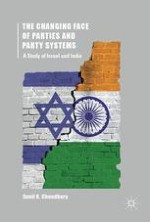2018 | OriginalPaper | Buchkapitel
11. The Ethno-Religious Parties (Ethno-Religious Block)
verfasst von : Sunil K. Choudhary
Erschienen in: The Changing Face of Parties and Party Systems
Verlag: Springer Singapore
Aktivieren Sie unsere intelligente Suche, um passende Fachinhalte oder Patente zu finden.
Wählen Sie Textabschnitte aus um mit Künstlicher Intelligenz passenden Patente zu finden. powered by
Markieren Sie Textabschnitte, um KI-gestützt weitere passende Inhalte zu finden. powered by
